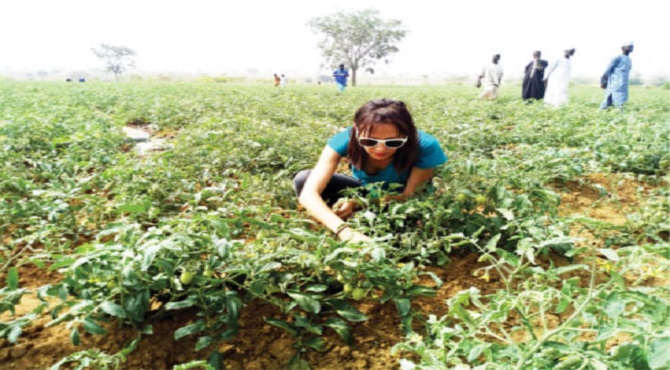Why tomato farmers are not meeting demands
In the last few years, there have been a number of investments in Nigeria’s tomato industry, but the country struggles to produce the quantum of tomatoes needed to close the huge import gap. The country produces about 2.3 million tonnes annually with the number of farmers estimated at around 200,000, contributing about 10.8% to tomato […]

A file photo of Mira Mehta, CEO Tomato Jos in Kaduna
In the last few years, there have been a number of investments in Nigeria’s tomato industry, but the country struggles to produce the quantum of tomatoes needed to close the huge import gap.
The country produces about 2.3 million tonnes annually with the number of farmers estimated at around 200,000, contributing about 10.8% to tomato production in Africa.
However, 45% of fresh tomatoes produced in the country is said to be wasting.
Nigeria is the 13th largest importer of tomato pastes in the world and the third-largest in Africa, something the country is working to address.
But reoccurring diseases, poor seed and agronomy practices continue to hamper production and farmers’ capacity to meet the demand for processed and fresh tomatoes.
In Kano State, farmers have attributed the inadequate production of tomatoes to unfavourable weather and constant diseases to their inability to meet demands.
According to the chairman of Tomato Out-Growers Association of Nigeria (TOGAN), Alhaji Sani Danladi Yadakwari, tomatoes don’t endure temperature above 38 degree celsius which experienced during the season, adding that the seeds they tried this season did not do well as expected.
He added that despite the fact that tomato farmers in the state had enrolled in the 2019/2020 federal government’s anchor borrower programme, farmers couldn’t adequately produce as expected due to the re-emergence of one of the most devastating tomato pests in the country-Tutaabsoluta.
He added that farmers also tried adopting a new variety which is said to have a high resistance to heat, but the seeds failed due to weather.
Another farmer, Malam Yahaya Usman Garunmalam, stated that due to losses constantly incurred as a result of bad weather, poor heat resistance seed varieties and poor storage and marketing facilities have led many farmers to abandon tomato farming.
He added that the enrolment of tomato in the anchor borrower programme had helped a lot and there is need for more government presence in the tomato production value chain to enable farmers produce the needed quality and quantity.
The Managing Director of Dangote Tomato Processing Plant, Malam Abdulkareem Kaita, said for over three years, the 1,200-tonnes per day capacity plant had not operated to full capacity due to inadequate supply, adding that the company had done a lot to ensure that farmers within the areas are adequately supported as the major off-takers under the anchor borrower programme.
According to him, the company introduced a high breed variety that is specifically meant for processing to the farmers and began trial of the variety last season with a satisfactory result as the company now receives more tomatoes than the previous years.
He added that the newly introduced variety had given farmers about 40tonnes per hectare and with good farm management, farmers can get double of that. He further revealed that to boost the company’s productive capacity, it expanded its engagement with tomato farmers from 1,000 to 10,000.
“All things being equal and with the government’s intervention, tomato farmers should be able to produce the needed quantity. As a company, we are also producing our own tomatoes to meet at least 40% to 50% of the demand,” he said.
One of the new entrants into the industry is the Spanish company, GB foods, which on June 15, 2020 completed a N20 billion tomato processing factory in Kebbi State.
It was gathered that the plant can process over N4 billion fresh tomatoes per season, producing 40 metric tonnes per hectare of tomatoes. To increase its production, about 5000 out-growers will be engaged.
The Chief Executive Officer of Tomato Jos, one of the earlier entrants in Kaduna, Mira Mehta, said the company had taken a different approach.
“Rather than starting with the factory and then looking for tomatoes, we started with a farm and intentionally did not invest in it until we were sure we would have enough raw materials to make it run effectively.
“We are currently in the process of building our processing plant, with a goal to commission it in February. We are working to build our commercial farm and our network of smallholder farmers in parallel, so that the factory will always have enough fruits,” she said.
Earlier, Tomato Jos said it would “work with thousands of smallholder farmers on over 2,600 hectares of land, putting more than N380 million of direct income into the local economy annually.
